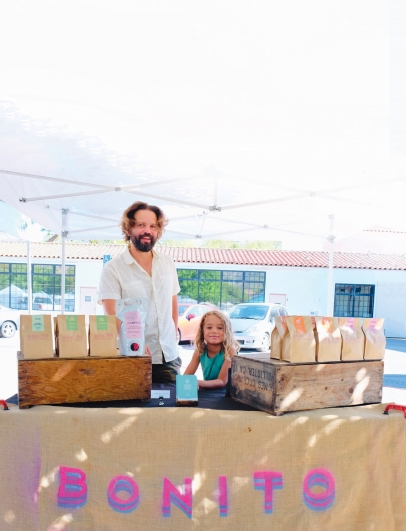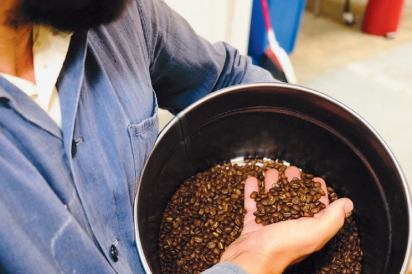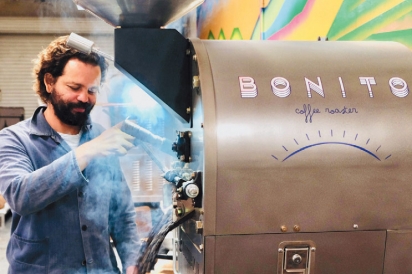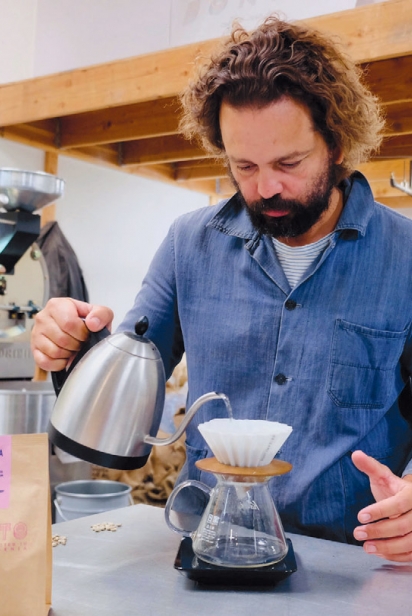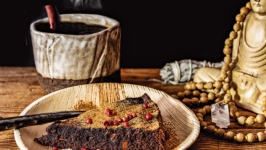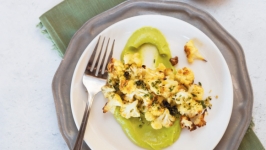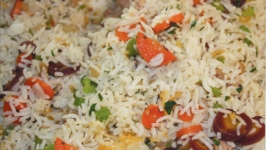Coming Home to Coffee
A roaster’s journey from Ocotal to Ojai
Carlos Ramirez is taking his time. When I arrive at his small-batch coffee roasting facility in Ojai early one Sunday morning, the promise of a cup of coffee sits on the worktable before us. There are beans, a grinder, a pour-over coffee maker and a kettle. Hoping I would be offered a brew during our interview, at home I had limited myself to a single cup of coffee made from pre-ground beans in my Mr. Coffee®. I think it best not to share this last part with Ramirez, given he makes his living roasting coffee beans, mostly from his home country of Nicaragua.
While I try not to stare too longingly at the implements of my hoped-for cup of coffee, Ramirez tells me about his childhood in Ocotal, a valley in the north of Nicaragua he describes as much like Ojai. As a child, his grandfather—a “coffee mechanic” who repaired coffee processing machinery—used to take him to the surrounding coffee plantations. “La montaña (the mountain) was a mystical place,” he tells me. He drank his first cup of coffee at age 8, diluted with milk straight from the udder of a cow on his grandmother’s ranch.
Born in 1978, Ramirez spent most of his early childhood in Belize, Mexico City and Miami while the Contra War raged at home. When the war ended in 1990, Ramirez returned to Nicaragua, where he initially went to live on his grandparents’ farm. When schools reopened, his classmates were the children of coffee farm owners, affording him up-close access to that way of life. “Things started to … click, and I knew I was going to be somewhere in agriculture.”
At this point in our conversation, Ramirez starts in earnest on making us a cup of coffee, grinding some beans. But like his path to agriculture, the road is winding.
Ramirez left Ocotal to work his way through college in Managua. When he was laid off from his job, a brother living in Los Angeles suggested he join him there. He arrived in 2005 and stayed the next 11 years, earning a degree at Cal Poly Pomona in food marketing and business agriculture. He joined Dole doing quality-assurance for their banana supply chain, following fruit around the United States.
Worn out from business travel, Ramirez left Dole and moved to Ojai with his family in 2016. The valley reminded him of Ocotal, and he wondered if the time was now to do something with coffee. He attended the Specialty Coffee Association of America show in Seattle to see what interested him.
“The people I jibed the most with were roasters. So I went to the Roasters Guild and learned how to roast.”
Ramirez started roasting at home and giving coffee away at the park and at parties. Eric Burdon of The Animals was throwing a concert at Libbey Bowl and asked him to roast 100 bags of coffee to give away to concert VIPs. This was a penny-drop moment: Ramirez knew he was onto something. He got his first local commercial account, then Caravan Outpost—an Airstream glamping site in Ojai—started buying his coffee. Bonito Coffee Roaster was born.
Somewhere between Los Angeles and Ojai, Ramirez has managed to turn on the kettle and our first cup of coffee materializes: a medium-roast Pacamara, named for the Arabica variety it’s made from. These are single-origin beans, meaning they come from the same type of plant on the same farm, or finca, which is printed on the label. Ramirez’s connection to place runs deep. “You want to roast the harvest,” he tells me. “My job as a roaster, one of my missions as a company, is to emulate that cup of coffee that you have at origin.”
I have never been to Nicaragua, but if my first sip of Pacamara is anything to go by, I’d sure like to visit.
In addition to signature medium roasts, Pacamara and Catuai, Bonito’s offering includes a dark roast named Dark Beetle, an espresso blend and specialty roasts like Bourbon from El Salvador. Both instant and cold-brew coffees are in development. After three years, Bonito is roasting 250 pounds of coffee per week, a number Ramirez wants to double in the next year, but “gracefully … keeping my way of life and enjoying the business.”
To that end, he’s been thinking a lot about values. “Bonito, right? It’s about the beautiful moments. It’s about that beautiful moment you have with someone while you’re drinking a cup of coffee.”
I look down at my phone to see I’ve been talking with Ramirez for the best part of two hours. I leave him to his roasting, grateful for this liquid reminder that sometimes it’s best to let things take their own time.
For more information visit BonitoCoffee.com.


